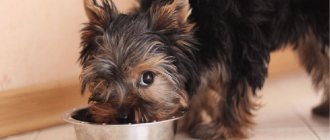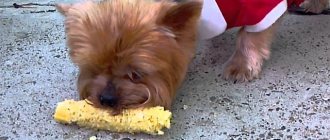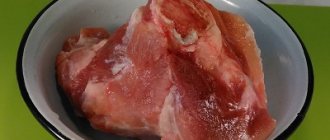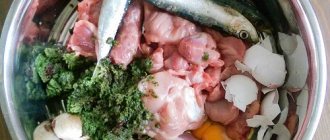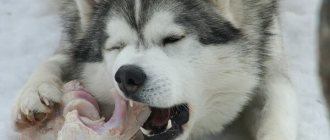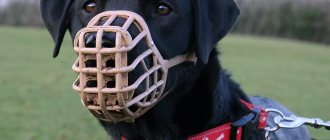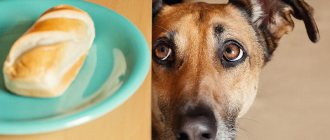Proper feeding is one of the main components in caring for a Yorkie. The breed is prone to dental disease and gastrointestinal disorders. And, as a rule, such problems are associated with improperly organized nutrition. Mixed and unbalanced feeding are the main causes of disturbances in the functioning of the digestive system as a whole. The dog owner needs to decide in advance on the type of food and create the correct diet. The owner chooses what to feed the Yorkshire Terrier, industrial food or natural food.
Consequences of poor nutrition
Feeding the Yorkshire Terrier high-calorie, fatty foods is one of the main reasons for the development of acute pancreatitis. The dog suffers from bloating, vomiting, diarrhea, and pain in the abdominal area. Mixed feeding also often leads to problems.
Frequent overfeeding and a high-calorie diet cause obesity, to which Mini Yorkies are very prone. As a result, pathologies of the cardiovascular system and musculoskeletal system develop.
All dental problems that arise in Yorkies are associated with improperly organized nutrition.
In representatives of this breed, saliva contains a large amount of mucin, which leads to the accumulation of plaque. The lack of solid food or specialized dry food leads to the formation of tartar in the dog. The latter problem contributes to the development of gingivitis, periodontitis and, as a result, tooth loss.
Allergy to meat in a dog
There are frequent cases of allergies in dogs to a certain type of meat. Allergic symptoms are standard and include:
- itching, rash, redness, peeling, hair loss;
- discharge from the eyes, ears, nostrils;
- swelling of the muzzle, some parts of the body, mucous membranes;
- labored breathing;
- unpleasant odor;
- frequent stool.
Any food can cause similar symptoms. Each organism has its own characteristics; representatives of the same breed have different reactions to specific foods. When introducing an innovation to the diet, it is important to monitor the pet’s condition; food that provokes allergic symptoms is excluded from the menu.
In some cases, blocking allergic symptoms requires the use of medications - hormonal, antifungal, antihistamines, antibiotics and other drugs. Drug elimination of the consequences of allergies occurs under the supervision of a veterinarian.
General feeding recommendations
Yorkies are a small breed of dog. Unlike large canines, they do not expend as much energy. Therefore, their food should contain less protein and carbohydrates.
An adult dog needs 50 kcal per day per 1 kg of weight. The average body weight of a Yorkie is 3 kg. Accordingly, a pet needs 150 kcal per day.
Approximately 50-60% of your Yorkie's diet should be animal protein. The remaining 40-50% comes from fats and carbohydrates. Additionally, the Yorkshire Terrier must receive vitamins and minerals from its food.
The amount of food eaten is influenced by factors such as:
- Age. Older Yorkies should receive 15-20% fewer carbohydrates than younger dogs.
- Gender. Males that are used for breeding need more high-calorie food. The nutritional value of feed for producers is increased by 10-15%.
- Season. In autumn and winter, calorie content increases by 15%.
- Physical exercise. With active training, the amount of protein in the diet is increased to 15-30%.
Yorkies are prone to overeating and obesity, so the food bowl should not be constantly available. 15 minutes are allocated for feeding, after which the remaining food is removed.
An adult dog from 1 year of age is fed 2 times a day at the same time, a month-old puppy - up to 6 times a day at equal intervals. Food should be at room temperature.
The Yorkie is given food at least an hour before the walk or the same time after it.
When feeding natural food, additional vitamins are added to the diet 2 times a year (in consultation with the veterinarian). Breeders recommend using vitamin supplements from Royal Canin.
Are they necessary?
You can and should give fruit to your pet. They are an irreplaceable source of fiber, vitamins and glucose, so they should be included in the diet, especially if the dog is fed natural food. Besides, it’s simply delicious: you don’t refuse treats, do you?
There is an objection that in nature dogs do not eat fruit; their stomachs are accustomed exclusively to meat. But this is not so: firstly, nothing prevents an animal in the wild from picking up fruits, especially since dogs are not so much descendants of predators as of omnivorous scavengers.
Secondly, four-legged pets live next to humans for thousands of years. And during this time they adapted to human habits and food.
Natural or industrial feed: pros and cons
The debate between supporters of industrial feed and natural nutrition continues. Each type of feeding has its own advantages and disadvantages. What to feed the Yorkshire Terrier at home is up to the owner to decide for himself, after weighing all the pros and cons.
| Type of feeding | pros | Minuses |
| Natural | · Confidence in the naturalness of the composition. | · Requires time to plan the diet and prepare it. |
| · Possibility of adjusting the diet based on the characteristics of the pet. | · It turns out to be more expensive than feeding dry food. | |
| Industrial dry food | · Comfortable. | · There is no complete confidence in the quality of the product. |
| · It is easy to measure the required amount of food and divide it into portions. | · Sometimes it is difficult to choose the right food due to the individual characteristics of your pet. | |
| · Cheaper than natural food. | ||
| · Croquettes prevent the development of tartar. |
Natural nutrition
Feeding your Yorkie with natural food is a whole science. Some foods are important for a dog, others are useless or even dangerous to health.
Approximately 50% of a Yorkshire Terrier's diet should consist of animal protein. Fruits and vegetables account for 20-25% of the daily requirement. Porridge makes up 25% of the total daily diet.
A Yorkie should eat approximately 10% of its total body weight per day. For example, with a weight of 3 kg, the daily norm for a dog is 300 g.
Table of feeding rates for an adult dog per day:
| Product Name | How many grams to give |
| Meat and offal | 150-160 g |
| Porridge | 70-75-g |
| Vegetables and fruits | 80 g |
| Dairy products | 40 g |
The specified amount of food is divided into 2 feedings of the dog.
Protein sources
The main source of protein for Yorkies is muscle meat. It should make up 25-30% of the total daily ration and be present in feeding daily. An adult dog approximately requires 15-20 g of pure meat per 1 kg of weight, not including offal. For puppies, the need for meat food is 1.5-2 times higher.
The Yorkshire Terrier can be fed the following types of meat:
- beef;
- lean lamb;
- rabbit meat;
- horsemeat.
In addition to meat, Yorkies also benefit from offal: beef tripe (not advisable for up to 7 months), liver, heart. In addition to meat, they should make up no more than 15-20% of the total diet. Light can be given occasionally. It is not recommended to feed kidneys to Yorkies.
Pork is not suitable for feeding Yorkshire Terriers. It is highly allergenic, contains a lot of fat and often causes disorders of the digestive system.
Allowed meat products are given boiled to eliminate the risk of helminth infection. However, experienced breeders and veterinarians recommend feeding your Yorkie raw meat, previously frozen for 3 days. A thermally untreated product retains much more nutrients.
Cartilaginous bones and tails are fed raw. To strengthen and clean teeth, from 3 months of age, beef shins are allowed to be gnawed after trimming.
Your Yorkshire Terrier can be given chicken and turkey up to 2 times a week. Chicken by-products in the form of liver, stomachs and hearts are given exclusively in boiled form and no more than once a week.
Dogs are occasionally allowed weak meat broths. They are recommended to be given on the first day after giving birth to a Yorkie. You can also cook porridge in meat broths to increase the nutritional value.
Meat products are cut into small pieces and mixed with the “side dish”. It is not recommended to feed your Yorkie minced meat - it is poorly digestible and often causes digestive disorders. The exception is ground turkey, which is ideal for feeding Yorkshire Terrier puppies.
Once a week, boiled sea fish is introduced into the diet. Your dog can eat pollock, hake, and cod that have been previously deboned.
It is forbidden to feed Yorkshire terriers red varieties of fish, as they are highly allergenic. Mackerel, capelin and herring are too fatty and cause bowel problems. River fish is not recommended due to the high content of small bones.
When feeding fish, the daily ration is doubled, since the seafood product is less rich in protein than meat.
Once a week, give 1-2 chicken or 3-6 quail eggs, fresh or boiled.
Yorkies should have fermented milk products in their diet every day. Allowed are 5% cottage cheese, 1% kefir, yogurt, fermented baked milk, sour cream. Low-fat varieties of cheese (up to 10%) can be given as an occasional treat. Milk is only allowed for puppies under 3 months of age. In adult Yorkies, the fresh product is poorly absorbed.
Porridge and flour products
Cereals should make up 15-20% of the daily feeding norm. You can include rice and buckwheat in your Yorkshire Terrier's daily diet. During the cooking process, it is allowed to mix the recommended cereals in proportions of 1 to 1. Since rice removes sodium from the body, it is recommended to add a little salt to the porridge.
Semolina is allowed to be fed to dogs only during the period of rehabilitation after illness.
Oatmeal, peas and other legumes, pasta, and fresh bread are prohibited for Yorkies. These foods lead to indigestion.
Occasionally it is allowed to feed your pet unleavened bread and dry biscuits.
Vegetables and fruits
Vegetables must be present in your Yorkie's diet every day. Plant foods are a source of vitamins and fiber for dogs. Vegetables should make up 20-25% of the daily feeding intake. Yorkshire Terrier can be fed:
- broccoli and cauliflower;
- pumpkin and zucchini;
- cucumbers;
- carrots.
It is advisable to give vegetables raw - most vitamins are destroyed during the cooking process. It is recommended to mix carrots with vegetable oil or low-fat sour cream to increase nutritional value. It is also very useful to give the root vegetable whole. Chewing helps massage the gums and cleanse teeth of plaque.
Greens are added to food up to 3 times a week. Dill, parsley, and fresh salad are allowed.
White cabbage, potatoes, onions, beets, and spinach are prohibited. These vegetables cause flatulence and diarrhea in your Yorkie.
Wheat sprouts are sometimes added to the feed as a vitamin supplement.
As a fruit, you can add green apples to your daily diet. Red varieties can provoke an allergic reaction.
Watermelons, melon, and any edible berries are allowed.
Occasionally and in small quantities, bananas, apricots, and kiwi are given. From dried fruits, you can sometimes pamper your pet with dried apricots or prunes.
Vegetable oils and fats
Sources of fatty acids for Yorkies include sunflower, olive, corn and flaxseed oils. One of the types is included in the dog’s daily diet, 1 tbsp. l., mixing with food.
If the Yorkie does not receive additional vitamin complexes, add 1/2-1 tsp to the food. fish oil daily.
Natural food
Advantages and disadvantages
The main advantage of natural nutrition is the absence of artificial flavors, colors or flavor enhancers. The products are easily digestible and all the beneficial substances that enter the Yorkie’s body are of natural origin, and the menu is varied and does not get boring for the dog.
But “natural” also has significant disadvantages:
Having given preference to a natural diet, you need to additionally give your pet a vitamin and mineral complex.
Authorized Products
The Yorkshire Terrier can and should eat:
In addition, several times a week you need to give your pet boiled yolk, cottage cheese, kefir, fermented baked milk, yogurt and boiled vegetables.
It is acceptable to introduce into the diet as a treat a small amount of low-fat cheese and fruits - plums, pears, apples, bananas, melon or watermelon.
What is strictly contraindicated?
Foods that Yorkies should never eat:
Products that are strictly prohibited
Feeding unhealthy foods not only leads to health problems, but also shortens the pet’s life. What not to feed your Yorkie:
- any confectionery baked goods, butter, sweets;
- sausages, semi-finished products;
- products containing spices and large amounts of salt;
- raisins, grapes;
- avocado;
- mushrooms;
- juices;
- carbonated and alcoholic drinks.
Dogs that eat human food are prone to obesity, digestive problems and allergies.
You should not feed your Yorkshire Terrier tubular chicken bones. They are not digested, clog the dog’s intestines and often cause damage to the intestinal walls.
What to do if things get bad?
Vomiting and weakness after eating fruit can be associated with two things:
- The pet ate something forbidden.
- The fruit turned out to be of poor quality (lots of nitrates, overripe, treated with pesticides).
In this situation, you need to provide the dog with access to fresh air and drinking water. Induce vomiting if the pet cannot do this on its own, then give activated carbon based on the dog’s weight. And be sure to show the animal to a veterinarian.
Industrial dry food
You can feed your Yorkshire Terrier dog dry food marked “for dwarf” or “small” breeds. They have a special kibble shape that allows you to remove plaque and help your dog not gain excess weight, thanks to its balanced composition. The best food for Yorkies is represented by a line of at least premium class.
In addition to croquettes, your Yorkie's diet can be varied with wet food. It is preferable to use spiders of the same brand as the dry food.
For adult Yorkies
The following brands are suitable for feeding dogs over 1 year of age:
- Monge Mini Adult.
- Acana Adult Small Breed.
- Ava Fresh Meat Adult Small.
- Pro Plan Optiderma Small & Mini.
- Royal Canin Yorkshire Terrier Adulto.
Information on how much to feed can be found on the product packaging. Feeding rates may vary from manufacturer to manufacturer due to composition.
For puppies and nursing bitches
The following brands of dry food can be given to your Yorkie puppy:
- Monge dog mini - specially designed for small breeds of dogs under 1 year of age. It can also be used for nursing Yorkies. The food consists of 42% chicken meat. Cereals contain rice and a small amount of corn.
- Brit Care Mini Puppy is a grain-free diet for puppies from 2 weeks to 10 months, pregnant and postpartum bitches. Lamb meat is one of the main ingredients of the feed.
- Royal Canin Starter is ideal for complementary feeding during the weaning period of puppies. Recommended for pregnant bitches in the third trimester and during the period of feeding cubs.
At first, it is recommended to soak dry food for puppies with a small amount of boiled water.
For sterilized pets
After sterilization and castration, it is recommended to feed the terrier kibble with a reduced amount of calories. The following brands are used for feeding:
- Brit Care Mini Light & Sterilized.
- Pro Plan Optiweight Small&Mini Light Sterilized.
- Royal Canin Neutered Adult Small Dog.
Food for sterilized Yorkies not only helps control weight, but also prevents the development of urolithiasis in the dog.
For allergy sufferers
For Yorkies with sensitive digestion and prone to allergies, the following brands are recommended:
- Brit VetDiets Dog Hypoallergenic
- Royal Canin Hypoallergenic
- Farmina Cibau Sensitive Fish
- Hill's Science Plan Sensitive Stomach & Skin.
The food prevents digestive disorders and maintains healthy coat and skin.
For dogs over 7 years old
After 7-8 years, Yorkies are considered elderly. Suitable for this category of dogs:
- Hill's Science Plan Dog Adult Small & Miniature;
- Royal Canin X-Small Adult 8+
- Monge Daily Line.
Kibble for senior dogs helps maintain dental, musculoskeletal, and digestive health.
Feeding a Yorkie puppy
Until 4 weeks old, a Yorkie puppy eats only its mother's milk. Then the first complementary foods are introduced. You can start feeding a one-month-old puppy once a day with dairy products or pureed raw meat.
How many times a day to feed a Yorkshire Terrier puppy depends on its age:
- 1.5-2 months – up to 6 times;
- from 2 to 4 months – 5 times;
- from 4 to 5 months – 4 times;
- from 5 to 12 months – 3 times.
It is recommended to maintain equal time intervals between meals. After a year, the Yorkie is considered an adult dog, and he is transferred to two meals a day.
Puppies of small breeds, which include the Yorkshire Terrier, develop faster than the cubs of their larger counterparts. Therefore, in the first months of life they need more calories and nutrients.
The basis of the Yorkie's diet at 1-2 months is dairy products. Milk is fed separately or porridge is prepared with it. Also, the diet must include cottage cheese, yoghurt, kefir or yogurt.
At 1 month, the puppy can be given a small amount of pureed meat. Turkey and chicken work best at this point.
At 2-3 months, in addition to dairy products, the puppy’s diet is enriched with low-fat varieties of sea fish (once a week), permitted vegetables (broccoli, cauliflower, zucchini, carrots) and apples.
By the age of 4 months, you can feed your Yorkie puppy all the foods that are allowed for an adult dog. The exception is beef tripe, which is recommended to be given to babies no earlier than 6-7 months.
Approximate daily menu for a 1-2 month old puppy:
- 6 am – rice porridge with milk;
- 9 am – vegetables with pureed meat;
- 12 days – cottage cheese or milk;
- 00 – buckwheat porridge with chicken and fresh carrots;
- 00 – yogurt or kefir;
- 00 – pureed raw meat.
When feeding a puppy with natural food, the amount of meat eaten per day should be 20-30 g per 1 kg of weight.
The amount of food eaten at one time is 1 tbsp. l. on the. 0.5 g puppy weight. If the baby looks hungry and greedily licks the bowl after each feeding, the portions can be increased slightly.
Sometimes puppies vomit 20-30 minutes after eating. This may mean that the baby has eaten too much. It may be necessary to reduce feeding portions. If the pet owner is sure that the phenomenon is not associated with overeating, and episodes of vomiting are repeated from time to time, it is necessary to contact a veterinarian.
What is the harm of meat for a pet?
Not all meat dishes are recommended for dogs. A fatty product worsens the liver, overloads the digestive system, causing diseases of the gastrointestinal tract. Pork is the least common food eaten by pets; consuming it raw is at risk of contracting infections and parasites; you should also be careful when handling unprocessed meat from wild animals.
Harmful microorganisms are also found in other types of meat that are not heat-treated; questionable products are boiled or frozen. Each owner chooses for himself whether to keep his pet on a raw diet or feed him cooked food. It is believed that a dog’s stomach produces a sufficient level of hydrochloric acid, which has a disinfecting effect, so some dog owners feed their dogs the raw product without worry. A dog can become infected with parasites or infectious diseases on the street or from contact with sick animals. In order to minimize the risk of infection, they follow preventive measures - periodic deworming and timely vaccination.
Some types of meat provoke allergic symptoms; especially sensitive individuals may find it difficult to find an alternative; owners have to switch to special hypoallergenic foods.
The product consumed as food must be unspoiled, otherwise there is a risk of poisoning - vomiting and diarrhea, indigestion, and painful condition of the dog.
How to correctly transfer from one type of nutrition to another
The correct process of transition from one type of feeding to another takes 10-14 days. This time is enough for the Yorkie’s body to adapt to a new type of nutrition.
Over the course of two weeks, the amount of food the pet is switched to is gradually increased. This rule applies both when switching from natural products to industrial croquettes, and vice versa.
Mixed food types are prohibited for Yorkies. According to statistics, dog owners who practice simultaneous feeding of natural food and industrial food are more likely to encounter digestive problems in their pets.
What vitamins are needed?
For normal growth and development, Yorkies require the following vitamins:
The most popular and effective nutritional supplements:
Veterinarians also recommend Multitonic, a seafood-based supplement that contains the amino acids dogs need:
